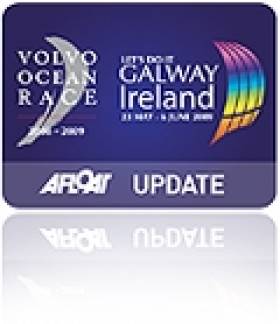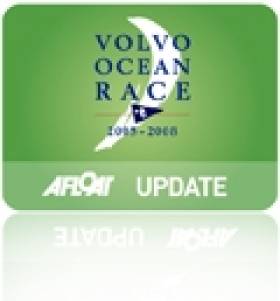Displaying items by tag: Nora Bheag
Exotic Sailing Dhows Join Volvo Ocean Race in Galway
#VOLVO OCEAN RACE - In final dash of colour and excitement to mark the end of Volvo Ocean Race finale week, two high performance sailing dhows – the distinctive Arabian sailing boats often compared to the famous Galway hookers – will bring an exotic flavour to the City of the Tribes.
The dhows, which are being presented to Galway City by the United Arab Emirates, will race on Galway Bay tomorrow Saturday 7 and on Sunday 8 July, crewed by 10 Emirati sailors who have flown in for the occasion.
The boats were earlier air-freighted from the UAE to Shannon Airport and taken by road to Galway where they were assembled and prepared for their weekend racing display.
The gift of the dhows to Galway is part of a newly inaugurated maritime heritage cultural exchange programme between the Galway Hooker Association and the Emirates Heritage Club in Abu Dhabi that has already seen the famous Nora Bheag and her crew set sail in the Persian Gulf city, as previously reported on Afloat.ie.
Padraic De Bhaldraithe, joint co-ordinator of the unusual exchange programme, said: “We were really delighted to take Nora Bheag and her crew to sail in Abu Dhabi and we were amazed by the amount of interest they attracted.
It was to be the first step in a partnership which has now seen two dhows make their way to Galway. Abu Dhabi and Galway have much in common when it comes to their maritime traditions.”
Enda O’Coineen - chairman of Let’s Do It Global, the organising committee of the nine-day festival built around the Volvo Ocean Race finale - says the arrival of the dhows is already creating huge excitement in the city, and the weekend racing should be spectacular.
“Dhows are built on lines similar to the traditional Galway hooker and are capable of very high speeds when raced in the hands of experienced sailors," he explained. “They are often fixed in the western imagination as a romantic Arabian seacraft of the past but they are still used for the transport of goods today and are also undergoing a dramatic revival among sailors in the UAE who don't want to lose their traditional past.”
Clifden-based Dr Peter Vine, who has been closely involved in the Irish-Abu Dhabi partnership, says the 'Dhows for Galway' project has huge potential and could add impetus to the move to revived and foster traditional boat-building skills that were on the verge of dying out.
The exchange programme has been co-ordinated with support of Let’s Do It Global; Emirates Heritage Club; Abu Dhabi Sailing and Yacht Club; Galway Hooker Association, Cóilín Hernon and family; Royal Galway Yacht Club; long-time Irish resident of Abu Dhabi, Noeleen Saeed; Etihad Airways; AlHosn University; Peter Vine; and Padraic De Bhaldraihe.
Showcase for Galway at VOR 'Irish Day' in Adu Dhabi
#VOLVO OCEAN RACE - Galway was showcased on Friday 6 January as part of special a 'Irish Day' celebration in Abu Dhabi, where the Volvo Ocean Race fleet is getting ready to embark on its next leg.
Galway Bay FM reports that the City of the Tribes was highlighted as a top international tourism destination - with the 'VOR Village' at Nimmo's Pier being a focus of discussions, according to Galway Mayor Hildegarde Naughton.
Earlier in the week saw the first sailing in Arab waters of the near-century-old Galway hooker Nora Bheag, which is in Abu Dhabi as part of a cultural exchange between these host ports of the 2011/2012 Volvo Ocean Race.
The race is set to finish in Galway on Tuesday 3 July 2012, attracting the world's media and thousands of visitors to Ireland's fifth largest city for the final prize-giving.






























































